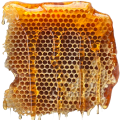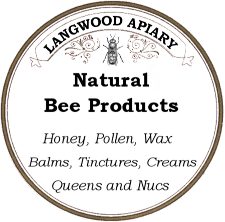 Honey is the final product of bee processing of nectar of flower plants, honeydew and other sugary substances. Therefore, honey is divided into floral and forest honey.
Honey is the final product of bee processing of nectar of flower plants, honeydew and other sugary substances. Therefore, honey is divided into floral and forest honey.
“Nectar” – translated from the Greek “drink of the gods.” It contains from 50 to 90 percent of water, the rest of sugary substances (sucrose, glucose, fructose, etc.) and a small amount of mineral substances, aromatic and coloring matter. In the hive, a bee-gatherer transfers nectar to a bee-receiver, which repeatedly swallows and releases nectar (120-240 times), enriching it with enzymes. Then the nectar is placed in the free cell combs. Other bees repeatedly transfer it to free cells. At the same time, due to the intensive ventilation of the hive, moisture evaporates, and under the influence of enzymes nectar is converted into honey with a humidity of 18–20%. During this process, honey is enriched with organic acids, minerals and, most importantly, antibacterial substances. The filled cells of honeycombs are sealed, but the process of ripening honey in them continues for another 3-4 weeks. Honey which was not allowed to ripen always contains a lot of moisture, quickly sours, loses its taste and healing properties and is suitable only for confectionery purposes.
Forrest Honey
Forrest honey can be collected by bees from the following sources:
- Excrement of some insects (aphids – grass lice, etc.) – colorless, sweet secretions on leaves and sprouts of oak, maple, poplar, birch, willow, pine. These small insects, in order to satisfy their protein requirements, feed on plant sap, which is extracted by piercing leaves. The excretions of these insects contain many sugary substances that attract bees.
- Honey dew which appears on the leaves of trees with sharp fluctuations in air temperature – heat during the day, cold at night. In composition, it differs little from nectar and is less harmful to bees than insect excrement.
